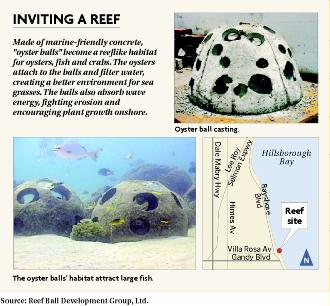|
|
TBO.com Keyword: |
|
|
|
|
|
About 90 volunteers formed
bucket brigade-style lines Saturday to pass 120- to 160-pound concrete
``oyster balls'' into the water on wooden stretchers. Then, they muscled the
balls to the bottom of the bay. They arranged the 125 balls in a 190-foot arc
to protect the only remaining segment of natural shoreline along the
boulevard seawall from further erosion. As the honeycomblike
oyster balls absorb energy from waves, more sediment should settle on the
sand spit, stabilizing the beach and perhaps enlarging it. The benefits don't stop
there. Each oyster ball is a minihabitat. ``They provide a foundation
which oysters will attach to and start to grow. Oysters need something hard
to grow on. They won't settle on sand or sea- grass beds,'' said Peter Clark,
Tampa BayWatch executive director. ``Oysters grow on the inside, outside.
They're out there filtering the water.'' Cleaner water invites sea
grass growth. And the balls make perfect homes for animal life. ``Big fish will cruise
around the outside of them, stalking little fish and crabs that live on the
inside of the balls,'' Clark said. The balls should attract snook, redfish
and sheepshead, he said. The project was funded by
a $7,200 grant from the Tampa Bay Estuary Program on behalf of the Bayshore
Beautiful Neighborhood Association. The sand spit is located
in Bayshore Beautiful. Association member Army Lt. Col. Eric McKsymick first
got the oyster ball rolling. McKsymick was fishing and
noticed fish hung around the waters off the beach. So he set out to save the
disappearing habitat, a lengthy process of securing advice, grant money and
permits. But McKsymick, formerly
stationed at MacDill Air Force Base, was moved to Alabama in August. Ballast
Point Neighborhood Association member Mike Flynn took over the project. ``This is the end result
of about three years of effort,'' said McKsymick, back to help Saturday with
the project he began. ``If it works out, hopefully, this is kind of the test
case. Hopefully, the city will support more and more.'' Flynn is organizing a
100-ball project in the waters off Ballast Point Park, tentatively set for May.
This spring, 900 balls
will be placed in the water southeast of MacDill Air Force Base. And Tampa
might place balls elsewhere along Bayshore to encourage new bits of shoreline
to develop, said Tampa Parks naturalist Julie Sternfels. As the oyster-ball placing
wound down, volunteers began to plant 1,700 salt-marsh cord grass plugs in
the intertidal area near the sand spit's edge. The cord grass project was
started by students at Young Middle School with BayWatch guidance. BayWatch
also helped volunteers pour 62 of the oyster balls; the rest were purchased. ``This is the beginning of
the mangrove process. It loosens and separates the soil,'' said Steve
McCreary, BayWatch board of directors president, as volunteers planted cord
grass. ``When a mangrove seed floats in on high tide, it's able to drop in
and it germinates. ... Inside of about a year, you will see small mangrove
plants already growing.'' Mangroves, McCreary said,
invite other life: ``A single mangrove plant can support thousands of
juvenile fish, crabs, shrimp. Everything fits together.'' Volunteers Saturday
included college and high school students, neighborhood association members,
military personnel from MacDill and affiliates of BayWatch, the estuary
program and the Coastal Conservation Association. Bayshore Beautiful
association Treasurer Lynn Cunniff stood in line, awaiting the next oyster
ball. ``I've lived here a long
time, and the bay used to be pretty stinky. I think it's nice we're trying to
bring back some life and some good stuff to the bay,'' she said. ``We've
still got a long way to go. But it's still a lot better than it used to be.''
Reporter Tim Bugansky
can be reached at (813) 259-7153. |
|
|
|
|
|
|
Breaking
News | Nation/World
| Metro | Sports | Business | Baylife |
|
|


